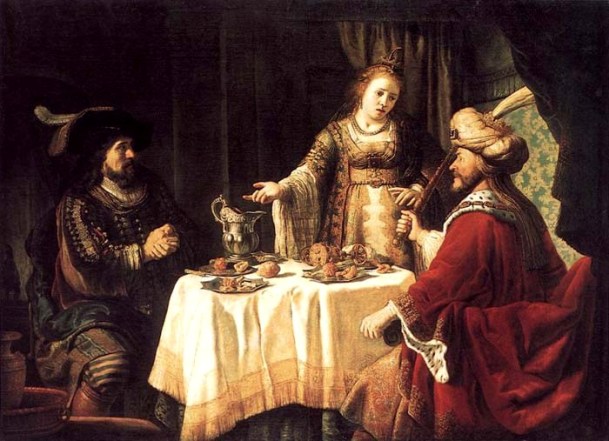Spiritual Sunday – Purim
This weekend Jews celebrate Purim, when Queen Esther risked her life to save her people. American poet Raymond Foss thought of Esther when he saw “some white New Hampshire parents…berating some Somali refugee parents for not speaking English while we were waiting outside our neighborhood elementary school.”
Foss says the following passages came to mind:
So the king and Haman went to Queen Esther’s banquet, and as they were drinking wine on the second day, the king again asked, “Queen Esther, what is your petition? It will be given you. What is your request? Even up to half the kingdom, it will be granted.”
Then Queen Esther answered, “If I have found favor with you, Your Majesty, and if it pleases you, grant me my life—this is my petition. And spare my people—this is my request. For I and my people have been sold to be destroyed, killed and annihilated. If we had merely been sold as male and female slaves, I would have kept quiet, because no such distress would justify disturbing the king. King Xerxes asked Queen Esther, “Who is he? Where is he—the man who has dared to do such a thing?” Esther said, “An adversary and enemy! This vile Haman!”…
Then Harbona, one of the eunuchs attending the king, said, “A pole reaching to a height of fifty cubits[a] stands by Haman’s house. He had it set up for Mordecai, who spoke up to help the king. The king said, “Impale him on it!” So they impaled Haman on the pole he had set up for Mordecai. Then the king’s fury subsided.
And:
Foss’s poem is even more urgent today as we witness Muslim bans, stepped-up immigrant roundups, and threats of increased “law and order.” Here it is:
Standing Up, Like Esther
By Raymond A. Foss
in faith, trusting in God, and
do the right thing, argue for justice,
fight oppression, from whatever corner
lead good lives, following our beliefs
standing up and being counted, risking all
if need be, to speak truth, to denounce evil
to save our people, other peoples, marginalized
subjected peoples, some in our midst,
we too can be righteous, choosing to be
accountable, our neighbor’s keeper
even here, even now, why not us?


